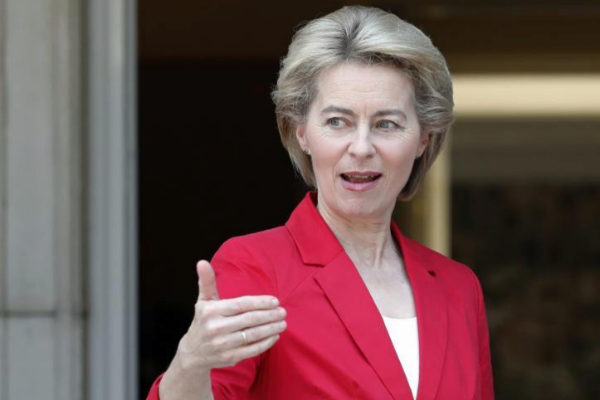Before the European Parliament , the president-elect of the European Commission, Ursula Von der Leyen, promised to use "all the flexibility allowed by the rules" in the framework of the Stability and Growth Pact . An internal document of the institution suggests the need to delve into the margin of maneuver of the Executive when applying the fiscal rules of the Union to avoid suffocating the weakest economies in case of recession.
As published by the Financial Times , and was able to confirm EL MUNDO, an internal document proposes a "substantial simplification" of the Stability Pact rules, a complex set of rules introduced in 1997 - and reformed several times - to strengthen the coordination and scrutiny of the economic and fiscal policies of the member states. Among the proposals would be, for example, the possibility of reducing debt targets - currently 60% of GDP - for the most vulnerable economies.
The text is the result of brainstorming by senior officials of the General Directorate of Economic and Financial Affairs of the Commission, a common practice in institutions, especially when a new stage is opened. However, the spokeswoman for the executive, Mina Andreeva , hastened to clarify that the document "has not been seen by anyone in the political hierarchy of the Commission or the elected president or her team." Andreeva insisted that the decisions are political, the Executive is in full transition, and it will be von der Leyen who defines his future course of action in this and other matters.
Deceleration
The debate comes in full deceleration of the world economy, with the growth of the Eurozone also in contraction and Germany - European economic engine - on the verge of recession. Although he did not go so far as to propose his reform, Von der Leyen committed himself in his political program to make use of the flexibility of the pact. "This will help us achieve a more favorable fiscal orientation for growth in the euro area while safeguarding fiscal responsibility," said the German.
But Von der Leyen also stressed his intention to "reorient the European semester so that we can continue to pursue sustainable development goals," he said in reference to the current European model for control and implementation of the Stability Pact. The economy, he said, "must be at the service of the people, not the other way around."
Although he did so in full attempt to win the support of European socialists to be officially nominated, the truth is that the discussion about the need for more flexibility in European fiscal policy is not new. Jean-Claude Juncker himself , president of the Eurogroup during the worst years of the financial crisis and still at the helm of the Commission, already warned in 2016 of the need to apply the pact "not dogmatically, but with common sense," and A few months ago he acknowledged that Europe had been too hard on Greece.
Juncker defended that it was necessary to "try to support and not punish the ongoing reform efforts" of those countries that had moved away from the deficit and public debt objectives set out in European legislation, 3% and 60% of GDP respectively.
An ambitious proposal
The financial crisis of 2008 was a painful confirmation of the interrelation of the economies of the member states and led to the deepening of the integration of the Economic and Monetary Union. In 2015, the Commission already detailed the application of flexibility in the stability pact, with the aim of relaxing the standards for those countries with problems, provided they presented a comprehensive and detailed program of reforms.
It was the years of a Greece on the edge of the abyss or of Spain and Portugal playing a fine - which would never come - for excess deficit. But some hawks , in northern and central Europe, see the white hand flexibility with those who do not meet the standards. Italy's strategy, which with an exorbitant debt presented an expansive budget, is not helping the debate. Meanwhile, the countries that suffered the hardest consequences of the crisis and whose public finances were resentful, on the contrary, see the objectives of the stability pact unattainable and believe that reform is necessary.
In a context in which the European economy resents again, with a hard Brexit potential on the horizon, Germany on the verge of recession and trade wars slowing the growth of the global economy, the Commission could go further.
According to the criteria of The Trust Project
Know more- Europe
- Ursula von der Leyen
- European Comission
It advanced 0.5% GDP slows and Spain reduces its growth to 2014 levels
Macroeconomics The fall of the pound shakes Johnson's hard Brexit
GDP contraction This will affect the Spanish economy the German prick

